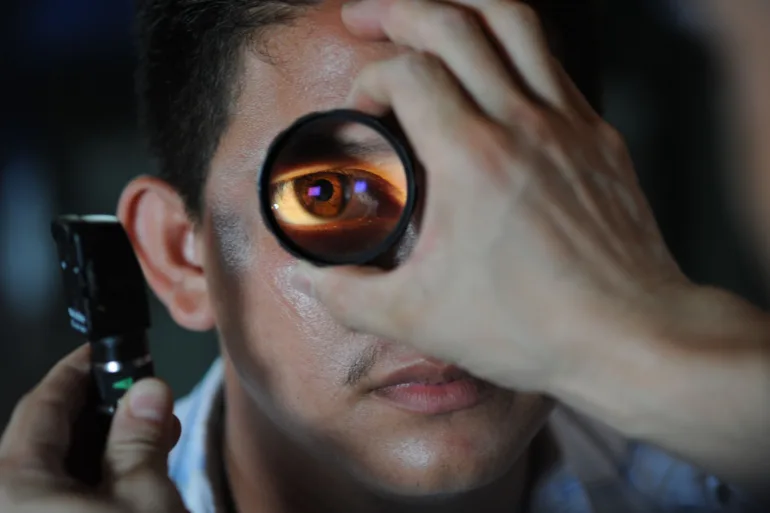TL;DR:
- Artificial Intelligence (AI) has emerged as a game-changer, particularly in the medical industry, driving advancements and improvements in various sectors of healthcare.
- The impact of AI in ophthalmology has been particularly noteworthy, with the Association for Research in Vision and Ophthalmology hosting its annual conference from 23rd to 27th April 2023.
- Verena Health is set to make a significant announcement at the conference, having developed Qdata Geographic Atrophy, a comprehensive clinical solution that leverages real-world data from nearly 350,000 de-identified geographic atrophy (GA) patients.
- Cloud-based ophthalmic image analysis platform provider Voxeleron recently announced the results of a study that showcases the capabilities of its Orion platform.
- The healthcare sector recognizes the potential of AI in revolutionizing the medical industry, with AI-based diagnostic and screening tools provider Toku receiving $8 million in Series A preferred financing.
- According to GlobalData’s forecasts, the AI market is expected to grow at a compound annual growth rate (CAGR) of 21.4%, with North America and Asia-Pacific leading the AI markets.
- AI continues to gain traction, and it is becoming clear that it will play a significant role in disrupting various industries, with 49% of respondents in a recent poll believing that AI will significantly disrupt their industry.
Main AI News:
In the world of business and technology, Artificial Intelligence (AI) has emerged as a game-changer, particularly in the medical industry. The utilization of AI has been instrumental in driving advancements and improvements in various sectors of healthcare. In the realm of ophthalmology, the impact of AI has been particularly noteworthy.
The Association for Research in Vision and Ophthalmology is hosting its annual conference from the 23rd to the 27th of April, 2023, and it promises to be a landmark event for the industry. Verena Health, a leading player in the field, is set to make a significant announcement at the conference.
The company has developed Qdata Geographic Atrophy, a comprehensive clinical solution that leverages real-world data from nearly 350,000 de-identified geographic atrophy (GA) patients. This allows Verena Health to diagnose GA from electronic health records and images, thereby enabling research and analysis. As the company continues to expand its ophthalmic image database, the number of GA patients is expected to grow.
Another key player, cloud-based ophthalmic image analysis platform provider Voxeleron, recently announced the results of a study that showcases the capabilities of its Orion platform. The study found that the Orion platform delivers higher accuracy and reduced variability compared to other original equipment manufacturer software from rival companies. The study demonstrated that Orion could analyze optical coherence tomography images from other manufacturers with greater accuracy and reduced variability, all while streamlining the workflow.
The healthcare sector has recognized the tremendous potential of Artificial Intelligence (AI) is revolutionizing the medical industry. One such company, AI-based diagnostic and screening tools provider Toku, has just received an $8 million Series A preferred financing to advance the development of its AI-powered retinal imaging technologies. The funding will be utilized to commercialize AI-powered technologies that analyze retinal images for biometric markers linked to overall health, risk of cardiovascular events, stroke, and diabetes.
According to GlobalData’s forecasts, the AI market is expected to grow at a compound annual growth rate (CAGR) of 21.4%, with the total value reaching $383.3 billion in 2030, up from $81.3 billion in 2022. Currently, North America and Asia-Pacific are the leading AI markets, while regulations are likely to slow down AI adoption in Western Europe.
As AI continues to gain traction, it’s becoming clear that it will play a significant role in disrupting various industries. A recent poll by GlobalData found that 49% of respondents believe that AI will significantly disrupt their industry, with 25% of respondents already witnessing the disruption caused by AI.
Conlcusion:
The growth of AI in the medical industry, particularly in ophthalmology, is evident and rapidly advancing. The upcoming annual conference of the Association for Research in Vision and Ophthalmology, along with the significant announcements made by leading players like Verena Health and the recent financing received by AI-based diagnostic and screening tools provider Toku, are all indicators of the growing interest and investment in AI-powered medical technologies. As the AI market continues to expand, it will likely play a disruptive role in various industries, including healthcare.
The future looks bright for AI in the medical industry, with GlobalData forecasting the market to grow at a CAGR of 21.4% and reach a value of $383.3 billion in 2030. North America and Asia-Pacific are currently the leading AI markets, while regulations are expected to slow down AI adoption in Western Europe.

